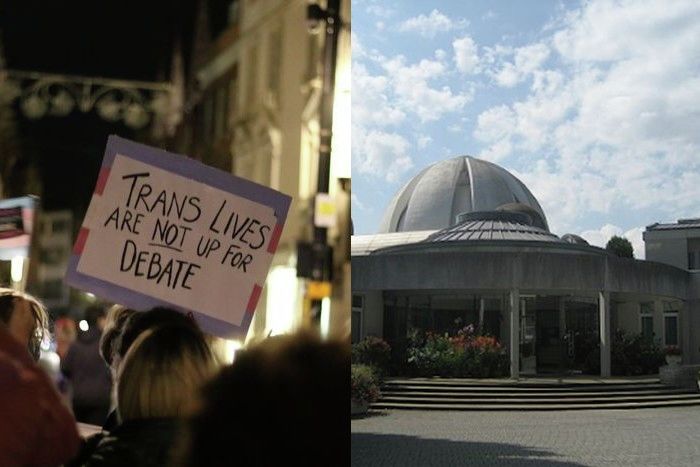Suchir: Is going vegan actually good for the environment, or is just it all politics?
Cambridge student activists continue to bring climate issues front and centre of University and college environmental policy. Darwin College has just announced it will be holding the first-ever “vegan” May Ball this year. Varsity’s Comment writers have been arguing for and against the SU’s motion to support a campaign to make the University Catering Services (UCS), which runs ARC Cafe and The Buttery in Sidgwick site; West Cafe and West Hub, fully plant-based.
At the start of the Easter term, I attended the Caius Green Formal Formal. (Formal formals? Yes, your “formals” are our “formal formals”, where we’re forced to get dressed up, rather than rocking up to Hall in joggers and a gown ... ) Clarissa Salmon, one of the authors in the Comment article in defence of the SU motion, gave an impassioned speech at the end of the formal about the importance of all students – regardless of whether they do STEM or humanities – joining movements to get involved in supporting climate issues. The speech did make me wonder how far all these measures will actually go to improving sustainability in Cambridge.
The University is still far from achieving its own sustainability goals – last term, I highlighted the results of a recent survey by Student Climate Network that showed a number of failings in the University in reaching its own environmental targets and performance. But serving vegan food at hall or a May Ball once a year does not necessarily meaningfully shift the pendulum towards improved sustainability in the University, although the recent council results do indicate that there is a growing appetite for Green policies in Cambridge. The solution is probably a mixture of scale (e.g. running a meat-free Monday as some JCRs have proposed) but also enabling choice (for instance, I think forcing veganism is particularly inhibiting for people with dietary requirements).
Andrea: Don’t conflate climate change and animal harm – 100% plant-based options is a political, non-scientific move
Decisions “from above” like that taken by the SU are what is needed to stir social behaviour and trigger further steps for climate action. Going vegan is admittedly not much better for the environment than vegetarianism – just removing ruminant meat from an omnivorous diet can lead to more than a 70% reduction in greenhouse gas emissions. The University’s already made major differences on this front, removing beef and lamb from its menus in 2019.
“Climate change and animal welfare are different fights, with different motives”
The Plant-Based Universities campaign that initiated the SU consultation is an initiative of Animal Rebellion (now Animal Rising). We should keep in mind that those for climate change and for animal welfare are different fights, with different motives, that require different, though possibly converging, actions.
Will a fully vegan University catering service significantly reduce students’ carbon footprint? The answer is probably no – though more “aggressive” decisions like the one taken by the SU can be justified as a series of small and collective steps. There’s a wide, inevitable gap between science and politics.
Laura: Collective good should be prioritised over individual choice
“The move could see diverse and naturally vegan (e.g. Ethiopian, Indian, Thai) cuisines integrated into college butteries”
Removing beef and lamb from the UCS menus led to a 10.5% reduction in carbon emissions, with a 33% reduction in carbon emissions per kilogram of food purchased, and a 28% reduction in land use per kilogram of food purchased. Each person has the right to their individual choice given the known consequences. However, the choice to go plant-based is different, because not everyone is aware of the gravity of its impact since it doesn’t only affect the individual at hand, but has disastrous consequences on the entire world. I agree that in some parts of the world a nutritionally complete vegan diet is hard to achieve, but in the UK a nutritionally complete diet is entirely possible and could see a diverse and naturally vegan (e.g. Ethiopian, Indian, Thai) cuisines integrated in college butteries. Food production is responsible for 26% of all human-made greenhouse gas emissions, with animal protein with the highest carbon footprint.
Nick: My Philosophy degree made me turn vegetarian (though not vegan)
Eating meat stands against everything I believed in: animals have interests just like humans, and ignoring those just because they are animals is a form of unjustified discrimination.
“I realised that if I didn’t turn vegetarian I would be a moral hypocrite”
I’ve realised that common defences for eating meat are not as strong as they first seemed. After reading about the ethics of eating meat in preparation for my Cambridge Philosophy interview, I realised that if I didn’t turn vegetarian I would be a moral hypocrite. The first question I was asked in my interview was: “I see you have read a lot on the ethics of eating meat – what do you think about the ethics of eating humans?” My panicked brain was taken aback by the blase delivery of a question about cannibalism. However, it led to an interesting and fruitful discussion in which I learned even more about the ethics of eating animals, including humans!
Audrey: Cambridge should reduce meat consumption more widely
“Hopefully, the SU’s decision will act as a catalyst for more downstream changes at the college level”
Fellows at Emmanuel College were served meat during a “green week” vegan formal reminding us that there is still much to be improved, and hopefully, the SU’s decision will act as a catalyst for more downstream changes at the college level. The changes in the UCS will likely still affect a significant portion of the student body, and may provide a more forceful nudge to those who might be interested in veganism to actually make behavioural changes.
Veganism has since been promoted as a lifestyle choice individuals can make to mitigate their effects on the environment, but can be difficult to maintain in a university setting where there is a high reliance on cafeterias. The transition from omnivorous to vegetarian diets are estimated to produce a large reduction in greenhouse gas emissions by 22%, and the further transition from vegetarian to vegan provides a smaller 4% decrease. Reviewing where meat consumption is still prevalent, such as college cafeterias, and aiming for reduction more widely may be a more effective and inclusive means of improving sustainability, rather than going fully vegan in selected locations.


